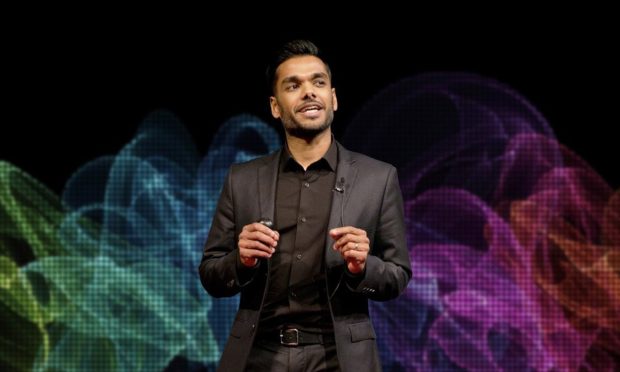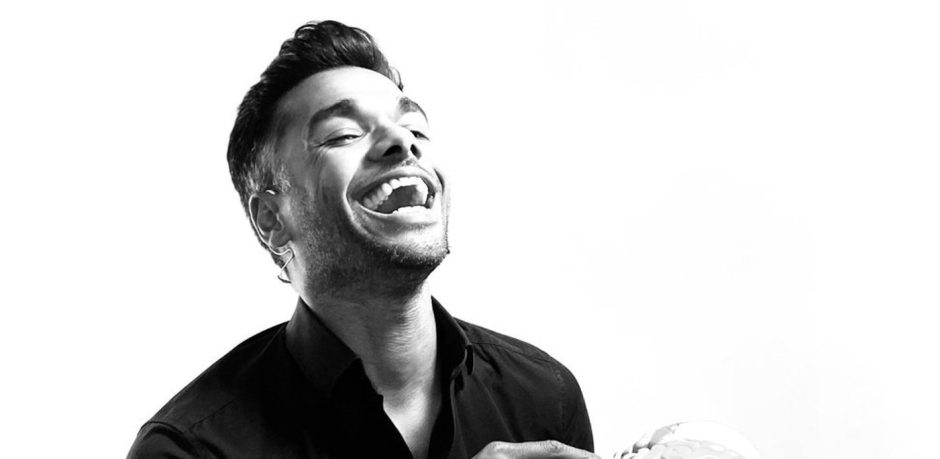As a boy growing up in Peterculter, Dr Tharaka Gunarathne had a party trick he’d perform for his parents’ friends.
“Whenever I got taken to the house parties of other Sri Lankan families, I’d sit there twiddling my thumbs, feeling very bored,” says the Aberdeen TV doctor who goes by the name Dr T.
“So I’d ask an adult to write me a shopping list of 100 items, and then I’ll take a few minutes to memorise it.”
The adults would then quiz Dr T on any item on the list.
“What’s number 57? What number was the tomato sauce?” he remembers. “And I’d get it right.”
His feats of memorisation, which he learned from a book his dad ordered through the mail, not only made him a hit at parties; they eventually helped him get into medical school at Aberdeen University.
Later, they helped him pass his professional psychiatry exams, eventually opening up a career in television appearing on shows including Channel 4’s Can I Improve My Memory and Scared of the Dark.
“I found it very entertaining,” he says of his memory feats. “I could memorise a 100-item shopping list backwards, I could remember details from photographs, all with these techniques.
“And it was a result of these techniques that trained my brain at an early age to learn in a more effective way.”
Aberdeen TV doctor to appear at Scottish tech festival
This week, Dr T will discuss memory and how to improve it at a Scottish tech festival aimed at encouraging more people into STEM subjects (science, technology, engineering and maths).
The Digital Science Festival, held by Scottish charity TechFest, will be hosted entirely online including workshops, presentations and interactive sessions, led by professionals across STEM.
Appearing on Wednesday November 6, Dr T will talk about how having a good memory is not just for kids from Peterculter who become doctors but is something anyone can aspire to, at any age.
“All of us probably have a better memory than we think,” he tells the Press and Journal ahead of his talk.
“It’s important to realise that your memory is more than just your ability to store facts, figures and other data and then recall it. Memory is habits; riding a bike, making a cup of tea, language, even reflexes.”
Dr T reveals how to improve memory
Dr T promises to reveal some of the best ways to improve your memory in his talk. However, as a sneak preview he outlined some of the factors involved in being better able to learn information and retain it.
The first two are simple – get more sleep and drink lots of water. Studies show that a rested and hydrated brain performs cognitive tasks better – as much as 10-20% better.
But it is also down to techniques, such as the ones Dr T learned from that mail order book. Mind mapping, for example, or memory palaces and simple mnemonics that associate certain words with images or places – used daily these are a training regime for the brain that, over time, will make it stronger.
“These are techniques that I myself learned as a child, and it was what really contributed to me getting straight A’s in secondary school here in Aberdeen, and working my way into medical school and then my professional psychiatry exams,” Dr T says.
And while the benefits can be academic, there are other reasons to improve recall. According to Dr T, people with better memories are perceived to be more competent, more interested in others and more interesting.
Ultimately, says Dr T, working on your memory skills will make you “fitter for everyday life”.
“It’s much like going to the gym and picking up some dumbbells and doing bicep curls,” he says. “That is generally a useless isolated skill because you don’t necessarily pick up dumbbells in your job.
“But what the training exercise does is keeps you fitter for the real-world assault course out there.”
Will computers replace our memories?
One real-world issue out there is technology. Most of us these days carry in our pockets a phone that is capable of remembering far more than we can.
So, just as calculators made long division redundant, will artificial intelligence do our thinking for us?
No, says Dr T. AI will be another tool for humans to use, not a replacement.
“Could we have robots to pick dumbbells up for us?” he asks. “Yes, but you know what? We’ll get muscle atrophy, and that would be bad for our physical health.
“Could we get robots to go do the shopping run for us? Yes, but then what we get is poorer cardiovascular health because we’re moving less.
“And could we have robots that can think for us? Yes, but then we’re going to start to have an atrophy of our cognitive skills, which has an impact on who we are as human beings.
He continues: “I think we’ll always want to be human, and we’ll always want to compete and grow.
“And at the same time, it’s going to be interesting how we adopt and integrate AI and the world of artificial thinking that supplements us being human, but doesn’t take it away.”
Register for Scotland’s Digital Science Festival for free via the TechFest website.
The full list of speakers is available here, alongside information on their topics of discussion and a programme guide.



Conversation